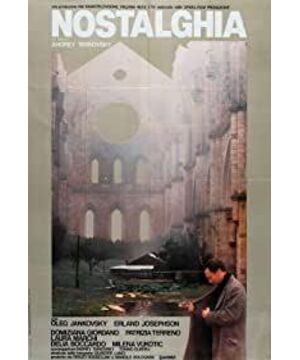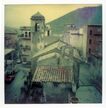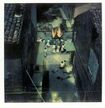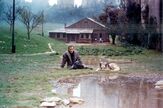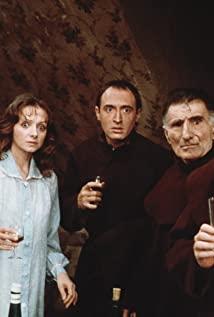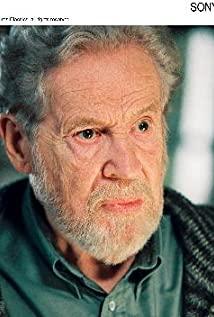—— The Soviet journalist Ovchinnikov 's "
Nostalgia" is the image accumulated by Sabi.
This is the representative work of the film poet Andrei Tarkovsky in the 1980s. The film tells the story of the famous scholar Gorchakov and female translator Aigna who went to Italy to search for the deeds of the composer Berezovsky, and met Domenic who had been wandering for many years, triggering an exploration of the soul.
Regarding Tarkovsky's films, it is unavoidable to say "poetic", and "Nostalgia" is still "poetic". But it would be too shallow to cover the work of one of the world's greatest directors with just these two words. Indeed, every shot of the master is almost perfect: the trickle in the hot spring, the rising water mist, the walls of the house eroded by wind and rain, and the scenes in the dream... Poetry flows in every minute and every second of the film. But this poetry is not the pale beauty in the eyes of the petty bourgeoisie, nor is it a landscape painting that pleases people. It can be seen that every shot is extremely rigorous, and I even feel that the shape of each tree and the traces of water stains are almost impeccable by the director. I can personally feel the endless, gloomy and painful thoughts lingering around; the conveyed heaviness penetrates the soul one by one with the flow of the picture and the poetic flow.
The theme is not a new idea, and the plot is even less important. Compared with this, the director's exploration of people's hearts, the foundation of the inner thoughts that constitute the protagonist, and the meaning of human life seem to be particularly close to the goal, because "there is no need to show this idea behind the scenes as if it were crowded with various events. canvas". Therefore, depicting the harmony of reality and longing, the heaviness of going far away, and the need for a complete existence of the world on a clean canvas accentuate the theme of nostalgia: this uprooted Russian alone carries all kinds of feelings that are difficult to sort out. And his inability to connect past lives with new experiences. Because the limitations of our own world that cannot be integrated when confronted by another culture are bewildered by our inner "taboos".
Going back to the film itself, dreams and reality are constantly alternating, the pictures and lights are full of metaphors and symbols, and all kinds of things exist to complete the theme. Like water, it represents vitality, a carrier for self-exploration and cleansing of the soul. At the end of the film, the hot springs dry up, so both lives end; like a feather, it symbolizes Gorchakov’s rootlessness and finally falls on the water. Go with the flow, unable to control life; in the mirror, Gorchakov saw his past and future, an image connecting reality and desire; the candle metaphor is just like the verse in the play:
"I am the candle,
in the Die in a feast,
please clean up the candles and tears in the ground after dawn,
and read from it who is worth mourning and
what should be praised.
We offer the last ray of joy,
how can we exchange for a peaceful death,
and how to temporarily borrow under the eaves,
how to live in After death,
use poetry to light up the front."
——Arseniy Tarkovsky
Even the soundtrack is carefully selected: that "Chinese music" and "Beethoven" are symbols of the culture and freedom of the outside world. The message of these images lingers in our subconscious, so we are manipulated by the atmosphere.
The characters in the play are the essence of the film, even Berezovsky who did not appear. He was a Russian serf composer. He lived in Italy for many years. After returning to his hometown, he committed suicide by hanging. It can be seen that the story of Berezovsky is exactly the situation and future of Gorchakov. There is also a more important character, Domenique, a frightened and unprotected drifter, so he confronts reality with spiritual power: to announce that the world is in danger. The so-called "normal people" thought he was crazy, but Gorchakov resonated with Domenico's suffering because of his own experience, and wanted to save mankind from the ruthless, deranged modern civilization and degenerate reality. In the end, Domenico set himself on fire, which made everyone realize that what he cared about was the entire human race, and his sense of responsibility was not abstract. Gorchakov also died. His death was because he could not make up for the lack of spirituality, unable to connect the past, present, and future, unable to unify the fragmented time, in the torment, only death. I have to say that the dog represents loyalty, morality and self-discipline. It is the "superego" in moral construction and psychoanalytic psychology. It is Gorchakov's soul, his love for his motherland, and his bondage to himself. . They all died because of the unbearable pain of life.
The final shot gives the whole film a home: in the dream, the house of the Russian hometown merges with the Italian church. This "hometown" is the home of Gorchakov's life; the "abandoned church" symbolizes the homeland of forgotten souls. This dream metaphor simulates the situation of the protagonist, and is the appearance of his encounter; the heart is divided, and there is no way to fight which kind of life, so only death can merge the two worlds together. The last snow was the "new contract" of Domenico's speech - "the night needs to be bright, and August needs to snow", which gave Domenico spiritual comfort.
The film is over, and we have experienced a spiritual journey. The real "nostalgia" is not only the theme of the film itself, but conveys the real pain of Tarkovsky. Only truth can make the film follow the psychological state and transform the emotional Injected into the film:
"Film art can become a matrix that nurtures individual souls and can convey unique human experiences. It is not just the result of random thoughts, but the real reality that unfolds before my eyes..."
-Andrea • Tarkovsky
View more about Nostalghia reviews


